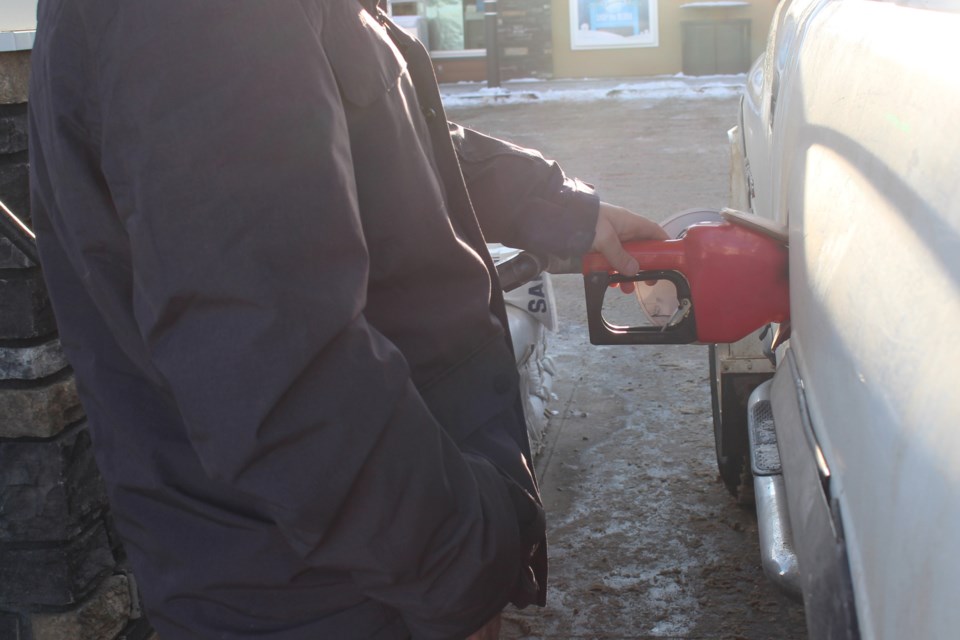BONNYVILLE - Locals aren’t in favour of the federal consumer carbon tax, or the increase it’s already seen to expenses such as fuel.
Andrew Romaniuk, owner of Aristocrat Taxi Line Ltd. in Bonnyville, noted it’s just another expense to local business owners.
“It could lead us to raise our prices to compensate the losses we have… but, I don’t know if we can raise the prices because of the competition in town so we would basically have to deal with the extra costs,” he said. “Our profit, which we have very minimal of anyways, will actually be less as a result.”
On Jan. 1, the cost of fuel increased by roughly four cents across Alberta to reflect a tax of $20 per tonne on carbon dioxide. Albertans will see another jump of around seven cents in April when the charge rises to $30 per tonne. The scheduled changes by the federal government will see the price go to $50 per tonne by 2022.
“I think it’s just another money grab,” exclaimed Town of Bonnyville Mayor Gene Sobolewski. “For those who rely on transportation, say for example haulers and people like myself who have to travel outside of town, all it is, is an added cost (and) all it does is we have to transfer costs to our clients and things like that.”
This isn’t the first time Albertans have been faced with the additional cost. A provincially-mandated carbon tax was put into place by the former NDP government, however, following the election, it was eliminated by the United Conservative Party (UCP) through Bill 1, the Bill to Repeal the Carbon Tax.
Thya Savisky, co-owner of Bonnyville businesses Lighthouse Specialty Smokeshop and Lakeland Arctic Spas and Purified Water Shoppe, noted they weren’t greatly impacted by the original carbon tax implemented by the province.
“There was definitely an increase to the cost of electricity, but it wasn’t so huge that it was a big concern. Costs go up, it is what it is, but we didn’t feel that it was so significant that it was putting us into trouble.”
The provincial government is challenging the federal tax in the Court of Appeal of Alberta. They’ve also shown support for Ontario and Saskatchewan, who are making an appeal to the Supreme Court of Canada after their provincial appeal courts upheld the federal carbon tax.
“In 2019, Albertans overwhelmingly rejected carbon taxes at the ballot box, twice,” said Alberta’s Minister of Justice and Solicitor General Doug Schweitzer in a press release. “We kept our commitment to scrap Alberta’s carbon tax, and while some pundits and politicians at home would prefer that we simply roll over and accept Ottawa’s unconstitutional imposition of carbon taxes on Albertans, we’re steadfast in our commitment to stand up for our province.”
The national carbon-pricing plan was introduced in October 2016 in order to encourage Canadians and businesses to use less fossil fuels. Town of Bonnyville resident Colby Robertson doesn’t believe the carbon tax will accomplish this goal.
“People are still going to need to buy gas. Making people pay more isn’t going to stop them,” he stated.
Lee Culford, Bonnyville resident, agreed, “It’s got to be a global effort, not just to nail us to the wall because we want to be accepted in other countries’ eyes. It’s got to be a global effect, or we’re not going to get anywhere.”
The increasing cost won’t be limited to the pumps, because the tax also applies to electricity and natural gas.
“What it will do is drive up everybody’s cost of living, and what for?” wondered Cold Lake Mayor Craig Copeland. “What is it getting us back to?... I think we need to stop gauging all of the people that are trying to make a living.”
In December, the Government of Canada also approved Alberta’s $30 per tonne carbon tax on industrial emitters. The tax is applied to 10 per cent of greenhouse-gas emissions from industry, including the oil sands, which took effect at the beginning of 2020. All provinces were required to put a price on carbon pollution for 2020, or a federal one would be implemented.
The new year also came with an initiative aimed at helping Albertans lessen the blow the carbon tax could have. The federal government has introduced the Climate Action Incentive program, a rebate plan where families of four can expect to receive just over $880 in 2020. Individuals could see around $440 come their way.
MD of Bonnyville Reeve Greg Sawchuk doesn’t believe the rebate will be enough to offset costs.
“For most folks, it will be a wash really between what they spend extra on basically every single item because everything that we consume… they’re going to have to lift the price in order to have the retailer to get (profit) back. I don’t think we’re going to end up being much further ahead.”
While MD resident Stephanie Ubsdell believes the rebate could help Canadians, she isn’t a fan of having to pay more at the pumps.
“It would have to balance (the cost) out more in a sense, but I understand what we’re doing with the green (initiatives) and all of that. I’m not opposed to that, but I’m opposed to the amount of money I’m spending,” she detailed.
With the federal carbon tax in full affect in Alberta, Savisky said she hopes “it does what it’s supposed to accomplish.”
“It’s supposed to make people more aware of what they’re using, being more eco-friendly, and it reduces our emissions.”



